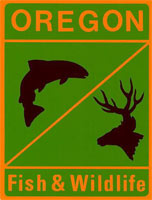Oregon DFW: Be ‘Bear Aware’ This Fall
OutdoorHub 10.05.11
Clackamas , Ore. – With the arrival of fall, wildlife biologists from the Oregon Department of Fish and Wildlife are reminding Oregonians that this time of year bears are on the move and conflicts between these animals and humans can occur. Biologists say that by following a few simple steps people can minimize the possibility of conflicts with bears.
, Ore. – With the arrival of fall, wildlife biologists from the Oregon Department of Fish and Wildlife are reminding Oregonians that this time of year bears are on the move and conflicts between these animals and humans can occur. Biologists say that by following a few simple steps people can minimize the possibility of conflicts with bears.
“Fall is a critical season for Oregon’s black bears,” said Tonya Moore, a wildlife biologist with ODFW’s North Willamette Watershed District. “Winter is around the corner and bears must get down to the business of accumulating fat reserves to see them through.”
Moore explained that during late summer and fall, bears typically consume large amounts of tree fruits, berries, and nuts in order to increase their body fat by as much as 35 percent in preparation for winter. To meet these extra demands for food, bears also look to other sources of food to gain the extra fat they need to tide them over through the winter.
ODFW often receives more bear damage complaints in the fall as a result of bears moving into residential areas to find easy meals, including garbage, fallen fruit, compost piles, pet foods and livestock feed. Moore said black bears may forage up to 20 hours a day and roam constantly throughout their home range to find a meal.
Once habituated to finding food near homes, bears can quickly become a threat to human safety and must often be killed. ODFW recommends people follow these guidelines to protect both humans and bears:
- Keep pet food indoors.
- Remove fruit that has fallen from trees.
- Add lime to compost piles to reduce odors ― do not compost meat, bones, fruit, dairy products or grease.
- Secure garbage cans in a garage, shed or behind a chain link or electric fence.
- Purchase bear-proof garbage cans if necessary.
- Clean garbage containers regularly with diluted bleach to reduce odors.
- Use electric fencing to keep bears from orchards, gardens, compost, beehives and berries.
- Store livestock food in a secure place.
- Never, ever feed a bear.
Moore noted that dispensing foods for other wildlife like birds, squirrels and deer can also attract black bears and is therefore discouraged. She recommends that people in areas where bears show up from time to time play it safe by refraining from feeding wildlife. In addition, working with neighbors to remove attractants can benefit the whole neighborhood, including the wildlife.
“Working with your community to make sure everyone is doing their part to avoid attracting bears is the best step you can take to minimize the risk of a serious bear conflict,” Moore said.
For more information about living with black bears, see the ODFW website.

